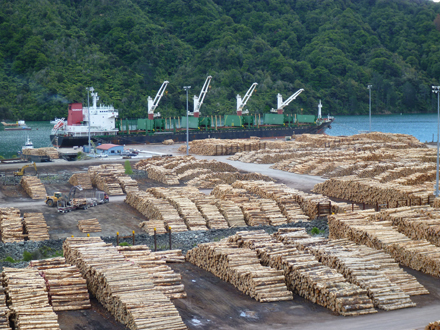
Forestry Minister Shane Jones has a blunt message for foreign investors that they will no longer be given free rein to export raw logs. Mr Jones was in China and Japan encouraging more investment in forestry once changes to the Overseas Investment Act come into force next month. But he says investors will not be able to just do what they like. Source: National Business Review NZ
“I clearly stated that the high tide mark, where New Zealand society is going to tolerate the wholesale exportation of all the raw logs with diminishing processing happening in New Zealand, has come and gone.”
In China potential investors told him they bought raw logs from New Zealand because that is what the rules here allowed.
“You change your policy then we’ll change,” he says they told him. And the rules are going to change but just how is not quite clear yet.
“We’re going to come up with some options. I’m not entirely sure what they are. They will not include an export tax. I’ve been told by David Parker that’s illegal although I campaigned on it.
“But there’s no shortage of other options. We already restrict the ability of people to export indigenous timber. I don’t want to restrict the ability of people to sell logs but first I want them to observe the obligations to wealth generating, job generating, Kiwi-based businesses and people should expect that from me as the first citizen of the provinces,” Mr Jones said.
The China connection In the year to the end of March forest exports rose 15.8% from the previous year to $6.2 billion. China took 47% of New Zealand’s exports, including 75% of its export logs.
Mr Jones says the Chinese market has grown remarkably.
“It has been an economic life line but I just don’t think it is sustainable model.”
Mr Jones says one thing that concerns potential investors the most is the need to have a guarantee of supply to justify a 30-year investment in processing plant. He says he made the point to the Chinese that New Zealand believes in the rules of international trade which was “music to their ears” in contrast to the trade dispute with the United States.
“Although we’ve opened up the opportunities for foreign direct investment at a larger scale through the OIA changes, the appetite really and the expectation of the government and the regions is that we are going to process more of this raw material.”
He says delegates from the US, Canada and Russia all made the point that New Zealand is the last country in the world to maintain a purely laissez faire approach to its forestry industry while the others all require their logs to be processed before being exported.
Mr Jones says his job is to challenge the economic orthodoxy of the past 30 years in New Zealand. In particularly he wants to ensure the wall of wood that will come out of the East Coast is substantially processed in Gisborne before being exported.
“I don’t care if that sounds like economic hooliganism. That is what I’m going to try to do.”
He says Japanese investment in the New Zealand forestry industry is already substantial and they, too, want ongoing certainty about the supply of wood to their processing plants.
“Their fears are if they expand their investments in processing what guarantees can I give them about adequacy of supply.”
He says until now successive governments have left it all to the market and the log market has spiked, partly because of cost advantages in China, but it is a privilege for people to invest in New Zealand and it comes with obligations.
“I’m a politician who’s about to remind everyone of their obligations.”





